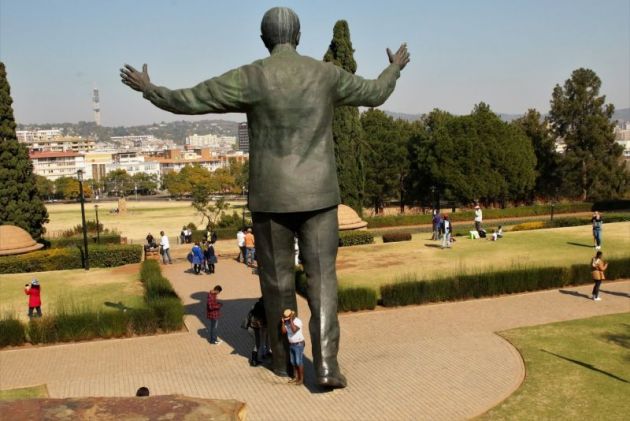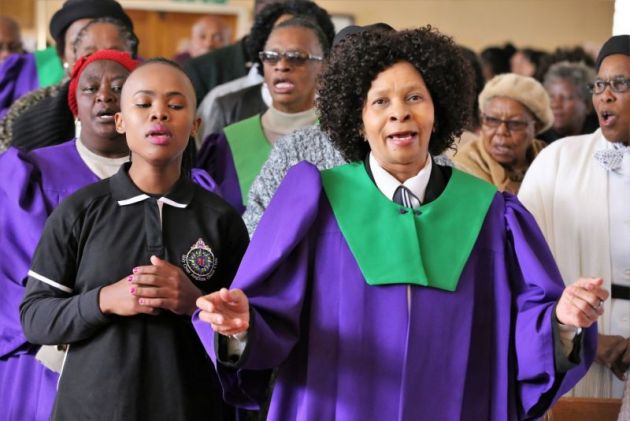S. African bishops urge politicians - 'work together' - after governing party loses 30-year long majority

South Africa's Catholic bishops have joined other Christians in urging politicians to 'work together' after the African National Congress lost its parliamentary majority for the first time since the country's first universal suffrage elections 30 years ago.
The May 29 elections saw the ANC, Nelson Mandela's party, lose its outright majority, which it had retained since the country's first democratic elections in 1994.
This year, the ANC's proportion of the vote plummeted to 40 percent. In the 2019 election, the ANC polled 59 percent of the votes.
Scores of newly-formed parties had contested the election as worsening economic inequality undermined the ANC's support, but the Democratic Alliance polled the second highest tally when it clinched almost 22 percent of the vote.
President Cyril Ramaphosa addressed the nation after the official announcement of the election result in Johannesburg on June 2.
In a statement issued on June 3, the Southern African Catholic Bishops Conference (SACBC) called on all "parties to avoid utterances and behavior that could lead to acts of violence, destruction, and loss of life."
The constitution in South Africa stipulates that the party with the largest vote has two weeks from the result confirmation to form a new government.
For the first time, the ANC will have to form a coalition government with one or more opposition parties to remain in power.
In their National Elections Results joint statement, the Catholic bishops congratulate the Independent Electoral Commission "for yet again demonstrating professionalism and efficiency in facilitating elections" in the country.
"We also thank the political parties for their vigilance in noting some concerns during the voting process and the IEC's willingness to address these objections as provided by the Act governing the IEC," the bishops said in their statement signed by Bishop Sithembele Anton Sipuka.
As the ruling African National Congress received only 40.18 percent votes the election it will need to make a deal with other parties to form a coalition government for the first time in 30 years.
In the June 3 statement, the Catholic Bishops in South Africa, Botswana and Eswatini called on "all parties to avoid utterances and behaviour that could lead to acts of violence, destruction, and loss of life."
"This includes making threats, inciting violence, or spreading false information that could escalate tensions," they said.

Political parties were on June engaged in coalition talks, and the bishops say coalitions present a "unique opportunity for those elected to work together for the good of the country, putting all ideologies aside."
"More importantly, politicians must focus on what needs to be done to serve the people who elected them and choose people for positions and roles according to their capacity and passion to carry out those tasks," they add.
In a televised address to the nation, President Cyril Ramaphosa called upon political to work together for the good of the country,
'SEEK COMMON GROUND'
"What this election has made plain" Ramaphosa said, "is that the people of South Africa expect their leaders to work together to meet their needs. They expect the parties for which they have voted to find common ground, to overcome their differences, to act and work together for the good of everyone."
"Our people expect all parties to work together within the framework of our constitution and address whatever challenges we encounter peacefully and in accordance with the prescripts of our constitution and the rule of law," said the president on June 2.
A Christian government worker in South Africa urged people to pray for shared values and justice after the ANC lost its majority for the first time since the apartheid ideology of intense segregation ended formally 30 years ago.
Sanmarie Moore told Premier Christian News she was heartened that so many people exercised their right to vote with long queues at polling stations.
And she's reminding Christians to be "salt and light" as the country begins talks to appoint a new coalition government:
"People came out and voted and really wanted their voice to be heard," said Moore.
"As children of God our identity is in Jesus, but we want to be salt and light where we are. So that part was so beautiful to see that people want their voices to be heard."
More noted that numbers for the ANC have been declining in every election and I think as our democracy grows, people find their own voice and trust that they also have a say and can bring justice.
"There are several major issues, poverty, inequality and unemployment and many people are still ,after 30 years in desperate positions."
Ramaphosa said the result was a sign the South African people wanted more cooperation between major parties.
"South Africa remains one of the most unequal countries in the world, with 32 percent unemployed, along with soaring levels of crime. Immense frustrations with water and electricity shortages as well as corruption have led to growing criticism of the ANC government," NPR noted on June 1.
MK PARTY
The new MK Party of former President Jacob Zuma, who has turned against the ANC he once led, was third with just over 14 percent of the vote in the first election it has contested.
The Economic Freedom Fighters was fourth with just over 9 percent.
The election caps a dramatic fall and rise of the 82-year-old Zuma.
"While a conviction bars him from being elected into parliament, as leader of the MK, he could now be a significant player in the negotiations to form a new coalition government and could use his power to attempt to avoid a further conviction," NPR commented.
"Zuma was forced to resign from the presidency in 2018 and was convicted in 2021 of failing to present himself at a corruption trial against him. He is also due to be tried again next year for corruption in an alleged arms deal in 1999."